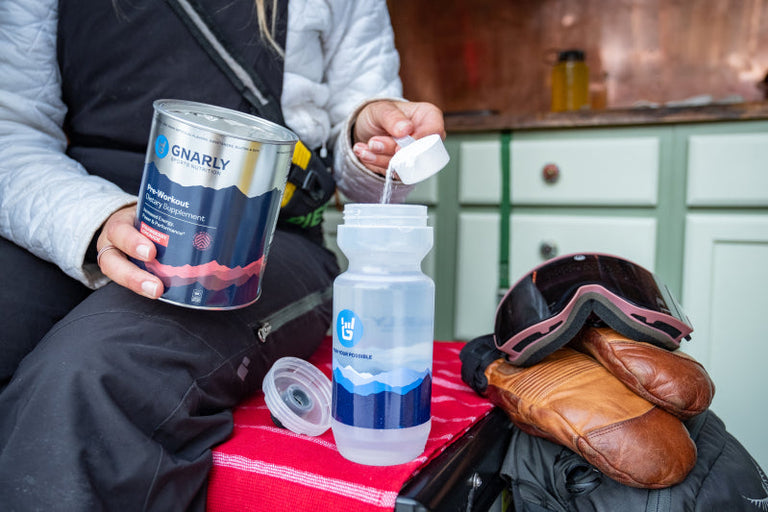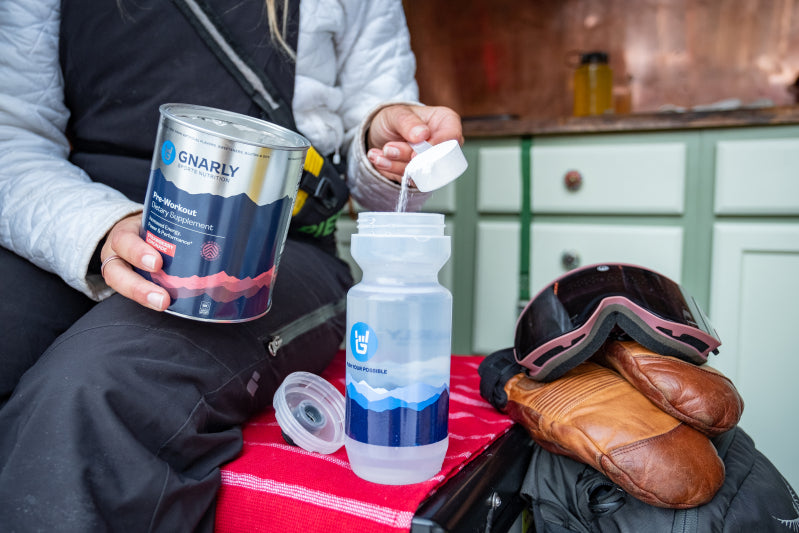Do you drink coffee or caffeinated pre-workout before training sessions or races? If so, you've likely noticed the positive impact it has on your mental and physical performance.
Caffeine is a complex combination of chemicals stimulating our brain and spinal cord (3, 10). Since it's legal, simple to find, and easy to consume, it's used by more than 75% of athletes as a method to increase focus,alertness, to relieve headaches and to gain a competitive edge before their efforts (5,9). For even high-level athletes, caffeine is allowed by the anti-doping agencies because it is viewed in a positive light, unlike steroids. Over the last several years, sports researchers have helped us understand what it is about our "go juice" that makes us go.
Physiological Impact
If you're like most, you started your day with a cup of coffee. But what exactly happens physiologically that gets us moving in the morning? After you take your first sip, caffeine absorption begins within the body. Most caffeine consumed is absorbed through the digestive tract, triggering several biochemical reactions. Caffeine acts on adenosine receptors body-wide. Adenosine promotes drowsiness within the body, whereas caffeine blocks adenosine. When adenosine is blocked, you experience increased attention, improved focus, and reduced fatigue (3, 13, 16). Caffeine's central nervous system stimulation also increases blood pressure and urination. Since caffeine impacts most tissues of the body, it's hard to determine which body system takes the most credit for improving athletic performance (7).
Physical Impact
Caffeine-containing supplements like coffee, Gnarly Pre-Workout and Gnarly BCAAs encourage favorable performance outcomes when used the way they're intended. When you consume caffeine, it can stick around the body for a while. With an average half-life of 5 hours, if you drink 100mg of caffeine, it will take around five hours before there's only 50mg in the body. Because it can impact an athlete for quite some time, caffeine is convenient for sports that last several hours (12).
First, runners and cyclists know the importance of "carb sparing" during long events. The longer we move, the more dependent our body relies on carbohydrates for fuel. Caffeine during long events allows athletes' bodies to use fat as fuel for more time, encouraging movement efficiently for extended periods. Caffeine's sparing effect keeps carbohydrates within the blood and muscles stored longer, too (12, 19). A runner's liquid gold helps athletes move further for longer (19).
Luckily for us, caffeine also improves short, high-intensity exercise that doesn't rely on oxygen, called anaerobic activities (6). This awakening substance's influence on maximum power and strength is less clear. When performing a single repetition of as much weight as possible, caffeine slightly improves the amount we move and has shown more commonly in men than women (1, 12, 14). Although caffeine has little impact on the amount lifted during strength training, caffeine increases calcium within skeletal muscle. Calcium is essential for muscle contractions, facilitating the movement of structures making up muscle fibers. Necessary for contractions, caffeine's impact on muscle calcium encourages more muscle engagement during resistance training (12). Our bodies create powerful movements during our sports, like jumping in basketball or making a sharp turn while skiing. Power production or creating rapid muscle contractions are an essential part of nearly every sport, even cycling and running. A win-win for any athlete, supplementing with caffeine before training sessions can improve your ability to create these contractions while improving the accuracy of sport-specific skills.
As mentioned earlier, caffeine has been used for centuries to help manage pain. Similar changes in our perception of pain and effort occur during exercise. Caffeine makes exercise feel more manageable, allowing endurance athletes or individuals engaging in high-intensity interval training (HIIT) to push harder for longer (4).
Mental Impact
One of the reasons we've used caffeine societally for so long is its impact on our minds. We've learned that low to moderate amounts of caffeine is better for mental performance than too much. First, caffeine can improve our short-term memory, sometimes called working memory (16). Remembering where you parked your car at the gym would be an example of short-term memory. Our reaction time improves during simple tasks; we are more attentive and concentrate better when consuming caffeine. Smaller amounts of caffeine can help with anxiety. Still, as many people have experienced, too much caffeine can make you more anxious and nervous (16). Overall, you can bet large amounts of caffeine can negatively impact our memory, mood, and ability to give our all in sports or during a job interview. The older you are, the more sensitive you are to caffeine, while the more tired someone is, the more significant mood improvements are. This is why more people are morning people after their daily cup of java. Sometimes it's easy to forget our minds age along with our bodies; research even suggests caffeine can protect our brains against cognitive aging (16)!
Concerns
If you're a regular caffeine drinker, you've likely experienced what too much caffeine can do. Like many great things, overdoing it can be harmful. Although caffeine has many positive effects, there are also adverse effects, especially at high doses. Too much caffeine at once, typically greater than 200mg, can cause restlessness, tremors, accelerated heart rate, and anxiety (20). Some athletes experience caffeine-induced stomach distress and diarrhea while training, occurring due to caffeines' changes in the digestive tract. Many individuals habitually drink tea, coffee, and soft drinks. Even at low levels, an individual can depend on caffeine, similarly to other substances. Dependence on caffeine can lead to withdrawal symptoms, including headache, anxiety, trouble focusing, irritability, and low energy (17). These symptoms can lead to decreased memory, reaction time, and mental alertness leading to poor physical performance (17). Since caffeine can make falling asleep challenging, and reduces sleep quality, this can have more impact on our performance (20). Like many substances, caffeine can improve our mind and body components up to a certain point; beyond that, performance deteriorates (16).
Many believe that caffeine, particularly coffee, dehydrates the body. Caffeine is a diuretic, increasing our need to urinate (8). Since dehydration makes our performance sub-par, this is a concern. The diuretic effect of caffeine is more prominent in high amounts (8, 18). Caffeine mouth rinsing is a new method of ingestion. Mouth rinsing works by caffeine halting the body's adenosine receptors in the mouth to get the same effects as other ways of consumption. This approach has little impact on body temperature during exercise, sweat rate, or fluid-electrolyte balance, which are the factors that contribute to exercise dehydration (8, 21).
Recommendations
For improving your endurance or high-intensity exercise, the recommendation is to consume 3-6 mg/kg of bodyweight about 60 minutes before a training session or race (7). Aside from the adverse effects mentioned, too much caffeine can lead to a urine concentration exceeding 15 ug/ml and exceeding what is allowed in the NCAA (15). 3mg/kg of body weight is also appropriate for a woman during all phases of her menstrual cycle (11). For athletes wishing to use caffeine for more than a morning wake-me-up, consider the following:
- For athletes who don’t usually consume caffeine, try small doses to avoid stomach troubles.
- Consider your sleep schedule when you supplement with caffeine. If you don’t get enough sleep, your performance will suffer.
- Guidelines for supplemental caffeine use range from 3-6mg/kg around one hour before a race or training session.
- When in doubt, speak to a Registered Sports Dietitian for recommendations.
References
- Astorino, T. A., Rohmann, R. L., & Firth, K. (2008). Effect of caffeine ingestion on one-repetition maximum muscular strength. European journal of applied physiology, 102(2), 127-132.
- Bonita, J. S., Mandarano, M., Shuta, D., & Vinson, J. (2007). Coffee and cardiovascular disease: in vitro, cellular, animal, and human studies. Pharmacological research, 55(3), 187-198.
- Boolani, A., Fuller, D. T., Mondal, S., Wilkinson, T., Darie, C. C., & Gumpricht, E. (2020). Caffeine-containing, adaptogenic-rich drink Modulates the effects of caffeine on mental performance and cognitive parameters: A double-blinded, placebo-controlled, randomized trial. Nutrients, 12(7), 1922.
- Davis, J. K., & Green, J. M. (2009). Caffeine and anaerobic performance. Sports Medicine, 39(10), 813-832.
- Del Coso, J., Muñoz, G., & Muñoz-Guerra, J. (2011). Prevalence of caffeine use in elite athletes following its removal from the World Anti-Doping Agency list of banned substances. Applied physiology, nutrition, and metabolism, 36(4), 555-561
- Glaister, M., Muniz-Pumares, D., Patterson, S. D., Foley, P., & McInnes, G. (2015). Caffeine supplementation and peak anaerobic power output. European Journal of Sport Science, 15(5), 400-406.
- Goldstein, E. R., Ziegenfuss, T., Kalman, D., Kreider, R., Campbell, B., Wilborn, C., ... & Antonio, J. (2010). International society of sports nutrition position stand: caffeine and performance. Journal of the International Society of Sports Nutrition, 7(1), 1-15.
- Gonzalez, A. M., Guimarães, V., Figueiredo, N., Queiroz, M., Gentil, P., Mota, J. F., & Pimentel, G. D. (2020). Acute Caffeine Mouth Rinse Does Not Change the Hydration Status following a 10 km Run in Recreationally Trained Runners. BioMed Research International, 2020.
- Grosso, G., Micek, A., Castellano, S., Pajak, A., & Galvano, F. (2016). Coffee, tea, caffeine, and risk of depression: A systematic review and dose-response meta‐analysis of observational studies. Molecular nutrition & food research, 60(1), 223-234.
- Jenkinson, D., & Harbert, A. (2008). Supplements and Sports. American Family Physician, 78(9), 1039- 46. Retrieved October 30, 2009, from Research Library. (Document ID: 1584143711).
- Lara, B., Gutiérrez-Hellín, J., García-Bataller, A., Rodríguez-Fernández, P., Romero-Moraleda, B., & Del Coso, J. (2020). Ergogenic effects of caffeine on peak aerobic cycling power during the menstrual cycle. European journal of nutrition, 59(6), 2525-2534.
- McDaniel, L. W., McIntire, K., Streitz, C., Jackson, A., & Gaudet, L. (2010). The effects of caffeine on athletic performance. College Teaching Methods & Styles Journal (CTMS), 6(1), 33-38.
- McLellan, T. M., Caldwell, J. A., & Lieberman, H. R. (2016). A review of caffeine’s effects on cognitive, physical and occupational performance. Neuroscience & Biobehavioral Reviews, 71, 294-312.
- Mielgo-Ayuso, J., Calleja-Gonzalez, J., Del Coso, J., Urdampilleta, A., León-Guereño, P., & Fernández-Lázaro, D. (2019). Caffeine supplementation and physical performance, muscle damage and perception of fatigue in soccer players: A systematic review. Nutrients, 11(2), 440.
- The National Collegiate Athletic Association. 2019–2020 NCAA Banned Substances; The National Collegiate Athletic Association: Indianapolis, IN, USA, 2019.
- Nehlig, A. (2010). Is caffeine a cognitive enhancer?. Journal of Alzheimer's Disease, 20(s1), S85-S94.
- Patocka, J., Navratilova, Z., Krejcar, O., & Kuca, K. (2019). Coffee, caffeine, and cognition: a benefit or disadvantage?. Letters in Drug Design & Discovery, 16(10), 1146-1156.
- Pippin, S., & Harrison, B. (2021). The Effects of Regular Versus Irregular Caffeine Consumption in Mental Performance. The Journal of Science and Medicine, 1-11.
- Puga, A. M., Lopez-Oliva, S., Trives, C., Partearroyo, T., & Varela-Moreiras, G. (2019). Effects of drugs and excipients on hydration status. Nutrients, 11(3), 669.
- Shah, M. S., & Priya, M. J. Caffeine-Is it good or bad for health-A Review.
- Tabassum, F., Batool, I., Faiz, F., Ijaz, M., & Bashir, A. (2021). EFFECTS OF CAFFEINE ON ATHLETE'S PERFORMANCE. PalArch's Journal of Archaeology of Egypt/Egyptology, 18(10), 680-690.





